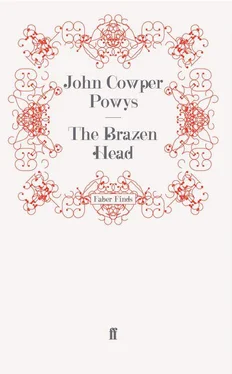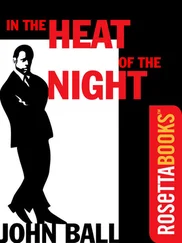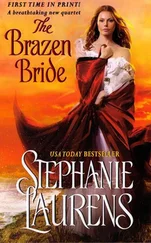“I have exchanged letters with him a good many times, as I suppose all disciples of Aristotle have done, and he and I have always agreed that the science of life didn’t end with Plato or with Aristotle or even with Grosseteste or with any other student of philosophy. But, my dears, the reputation of Albert of Cologne all over the world is terrific, greater than that of any other modern master. Every man who can read and write in this whole west country, whether they’re Franciscans or Dominicans, Monks, or Friars, Abbots, or Priors or parish priests, have heard nothing but praise of him since they first began their A. B. C.! When you come to metaphysics he’s the top boy, so to speak, of the whole schola mundi , if you leave out Israel and India and China! Now if we could send to Albertus some wise and diplomatic representative of our side, in this quarrel with Bonaventura, it strikes me that it’s not at all impossible that the great teacher from Cologne might be persuaded to come, as the most famous Dominican, to confront this troublesome Franciscan.
“That would soon, as we used to say in Ilchester, ‘settle the hash,’ of our Bona, the Venturesome! I am perfectly certain that what started the whole thing was the fact that your excellent parents, John, gave shelter in the Fortress to my Brazen Head. It was this that kindled all this obstinate rage in our ex-legate’s mind. He’s somehow got it lodged in his one-track sanctified midriff that the Holy Trinity we all worship has received a staggering blow from my having dared to create in the person of my Brazen Head a rival creation to Adam and Eve. I tell you, my good friends, I tell you, John dear, if we could only hit upon the right person to send as an ambassador to the great Albert now in Oxford, a person who would be in a position to escort him down here, with him as the chief Dominican to confront this pseudo-saint of the Franciscans, the whole affair would soon be settled.”
As can well be imagined, both Ghosta and John were now murmuring, each with their own special manner of emphasis and intensity, the name of Raymond de Laon; and Friar Bacon, as if to seek still further confirmation of this idea, looked first at Colin and then at Clamp. Both men came so close on getting this faintly interrogative glance that they completely hid the Friar from Ghosta and John, but a double vote of unqualified recognition of Raymond as their Ambassador to Albert of Cologne these two certainly did give; for the voice of Colin seemed to flap its wings in widening circles above every back and every head in the place; and the voice of Clamp seemed to drive in one rusty nail after another as he fastened up their decision over the Norman arch of the event.
“Well then, my friends,” cried the Friar, rising from his seat and moving quickly round the two men who were bending over him, “we may take it that our Council chamber has uttered its decisive verdict, and that Raymond de Laon shall be our ambassador to the great Albert in Oxford. Will you convey our request to him, John my lad, and let us know the result as quickly as possible? And now I think I must beg you all to descend to the lower regions of this hospitable Priory; for it is really absolutely necessary for me to finish this page of what I am calling my Opus Major before I sleep tonight; and your arrival, gentlemen, is the cause of this necessity, and I cannot tell you how grateful I am to you all for being this same cause.
“For the real truth is that your sudden appearance and the more than startling interest of what you have announced to me, combined with the expectation of encountering, man to man, he a Dominican and myself a Franciscan, the great Albert of Cologne, has caused me to remember certain intensely important details that I had completely forgotten relating to the journey of Brother William of Rubruck to the Grand Khan at Karakorum in Tartary, where he stayed from December 1253 till July 1254.
“It was Brother William himself when I met him in Paris who told me these things; and although at this moment I was writing about the sermon he told me he preached in Constantinople on Palm Sunday 1253, I had absolutely forgotten that great congress of religions over which the Mongolian Khan presided at Karakorum, a congress of the Mohammedan, Buddhist, and Christian religions, and I really must write about it while it has come back so vividly to my mind. I am sure I would have left out Brother William’s description of that Karakorum congress of religions altogether if our little meeting tonight, and our decision to send an ambassador to bring the head of the Dominicans to deal with the head of the Franciscans, hadn’t stirred up my memory of what the brother told me.”
A universal murmur, in such low tones among themselves as almost to convey the impression that, having been thus commended for stirring up the Friar’s mind, they were seized with the fear of so disturbing it by their lively discussion that the effect on his Opus Major would be destructive of the good they had already done, was the immediate result of this grateful appeal to their courtesy. Then without another word, and headed by Colin and Clamp, and followed by Ghosta and young John, they gave a series of quaint little good-night salutations and descended the stairs.
Friar Bacon was left standing alone in that topmost chamber of Bumset Priory. He still held the handle-end, so to speak, of the pen he had been using when he rose to return their valedictory gestures; and now automatically began moving it to and fro, as if the talk-charged air of that recently crowded room were itself the parchment upon which it was his destiny to hand down to posterity his ideas and his discoveries. Strange and far-reaching were the thoughts that passed through his head.
“Here am I,” he told himself, “one of the curious animals produced upon this planet that have come to be called men, and are now confronted by the necessity of recording for the benefit of future specimens of such creatures, what were the actual causes of our appearance upon this particular promontory of matter.”
The Friar at this point ceased inditing invisible words upon the invisible air, and, after deliberately replacing his pen upon the table by the side of his unfinished parchment page, crossed over to his bed and stretched himself out on his back upon it, with his head on the pillow, and clasped his shins with his hands.
“Little did I think,” he pondered, “what I should be doing in three years that night when Fontancourt showed me the letter he’d just had from our friend Petrus! Didn’t Fontancourt swear to me that Petrus would never stop studying magnetism or writing about his studies? Three years ago that was! O God, O God! what things have happened since then and are still happening!
“Why didn’t I tell those fellows just now before they went away that it was Peter Peregrinus, and not their old Roger, who first thought of using a lodestone to draw like to like; and that if it hadn’t been for that divine inspiration of his I could never have invented my Brazen Head? How we damnable inventors do love to hug our inventions and get drunk on the glory of them! And now I must needs defend my precious discoveries by setting this Dominican wolf upon our Franciscan fox!”
At this point the Friar let his thin legs sink down side by side on his bed, and lifting his clasped hands as high above his head as they could reach began murmuring — not in Latin, far less in Hebrew, but in the Wessex dialect of his native Ilchester — a homely and natural prayer: “O Everlasting God, who lookest down from far outside all this curst universe of matter which thou hast created”—and here he couldn’t resist using, with a wry touch of the incorrigible humour which not only characterized all his intercourse with others, but displayed itself even in his secretest thoughts about himself, and about the whole confused arena of contemporary speculation, as a little private joke between God and himself, the quaint, precise, technical, academic and metaphysical phrase for “outside our whole system of things”, namely the phrase “ ab exstrinsico ”, which, as he now muttered it aloud with a sort of chuckle in that slowly darkening room, would have had a queer effect upon any eavesdropper—“and ab exstrinsico save me!”
Читать дальше











